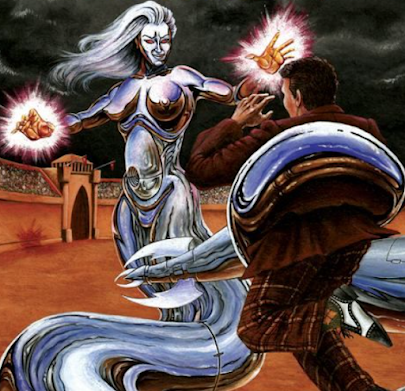Timewyrm: Revelation [PROSE/1991.12.5]
★★★★☆
I should've expected a Paul Cornell book to be incredibly detailed, engaging, and introspective. I guess I was just taken aback by how goshdarn ambitious it is, especially for something so early in an author's career (as talented as the author in question is).
Timewyrm: Revelation is, without question, the magnum opus of the Timewyrm tetralogy. Following a run of stories that went for alien worlds, alternate timelines and the birthplace of human civilisation, Paul Cornell's novel places the narrative almost exclusively to the most shrouded location in the entire Doctor Who mythos — the Doctor's mind. Nightmarish imagery of the highest order is delivered, as well as callbacks to the past that would send Gary Russell up in jitters. Colours flash in hues hitherto not seen by human eyes, empires rise and fall on a whim, and an old man with long, silver hair smells roses in a garden. There is a lot to take in, and the madness can sometimes get overwhelming (to the point where even Cornell starts to lose his grip on the novel's readability), but thankfully the story refrains itself from becoming excessive, too indulgent on established mythos.
If you're looking for a slice of Doctor Who that truly explores the Doctor's morality, Timewyrm: Revelation is the book you're looking for. The titular monster is a vehicle for the Doctor to (quite forcefully) confront the demons of his past and be pained by his failures — the result of his manipulative will to maintain control, so to speak. It is only through Ace's character growth throughout the novel that the Doctor discovers a part of himself he'd considered long gone, and in turn grows as a character himself. Isn't it wonderful that the Fifth Doctor, always the one to face demons with brave hearts, is the champion of conscience? Isn't it wonderful that Ace restores that conscience within her Doctor, both by returning a meaningful flower to him and forgiving him for all the deceit and manipulation he dragged her through, because it was her choice to stay in the TARDIS? Choose life, choose a comfortable and happy life of ignorance and hatred concealed in the farce of fitting in with the crowd — or choose life, choose death and destruction, and an overwhelming sense of purpose as the universe beckons for your help.
*:・゚✧*:・゚
As the Timewyrm saga draws to a close, I must say I was overall satisfied with what I got. Its beginning portion may have been less than stellar, but it steadily won me with beaten paths proven by years of Doctor Who on telly... and with Revelation, Paul Cornell made the ultimate statement that the Virgin New Adventures was very much its own, beautiful and rich beast. It was here to stay, and stay it did for quite some time. This novel right here is the first time in the Virgin series that an installment actually felt mature. Too broad and too deep for the silver screen, what have you. Terrific stuff, this is — read it.





Comments
Post a Comment